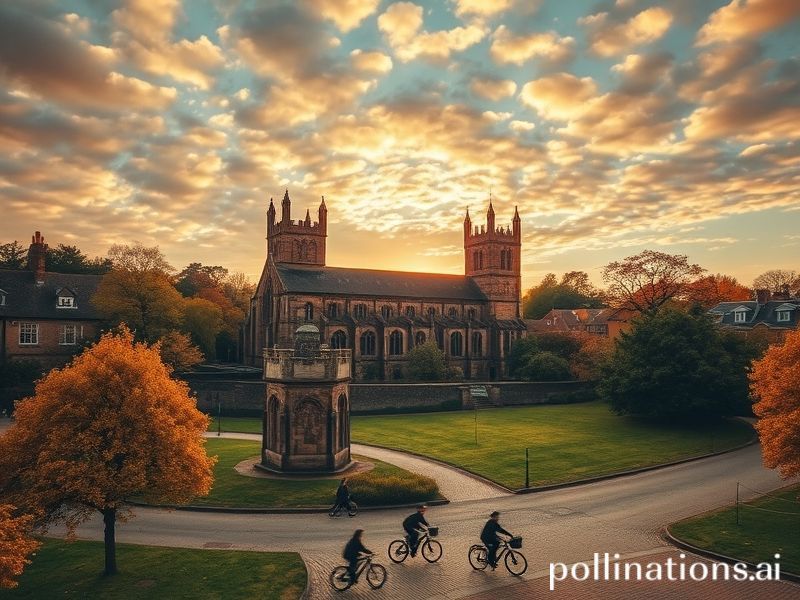Durham University: Britain’s Gothic Assembly Line for the Global Elite
Durham, England – In the grand casino of global higher education, where Harvard chips cost the GDP of a small island nation and Oxford’s croupiers still wear Tudor ruffs for branding purposes, Durham University sits at the high-rollers’ table with the quiet menace of a poker player who’s already mortgaged the family castle. To the uninitiated it’s merely the third-oldest English university, a charming medieval outpost 15 minutes up the railway from Newcastle, should your trust fund stretch to a £2.70 off-peak fare. To the rest of the planet, however, Durham has become a case study in how to export British elitism with a straight face while the home country cheerfully self-immolates.
Consider the numbers: 40 % of Durham’s 2023 intake arrived clutching non-UK passports, a statistic the marketing department prints in bold, as though national sovereignty itself were a quaint access scheme. Among them, one in five Chinese undergraduates has parents who can spell “Xi Jinping Thought” but would prefer their only child major in Finance while living in a Norman castle. The university helpfully accommodates this desire by converting ancient chapels into en-suite bedrooms—because nothing says “authentic British heritage” like a 13th-century oratory retro-fitted with Japanese smart toilets. Meanwhile, back in Beijing, state media tut-tuts about “foreign ideological infiltration,” apparently unaware that the biggest ideological payload shipped eastward is an enthusiasm for Harry Potter formal dinners and subsidised port.
Durham’s rise matters internationally for the same reason a seemingly provincial Swiss bank matters: it is a node in the circuitry that moves power, capital, and influence under the cover of gothic spires. When the Treasury coffers in London ran dry—an annual ritual now scheduled between prime ministerial resignations—Durham simply pivoted to Gulf money. The Centre for Islamic Economics, opened in 2022, was bankrolled by a Saudi foundation whose chair praises “moderate” fiscal policy between yacht stops. The donation, a modest £8 million, is roughly what Manchester United pays a single midfielder to bruise his ego each season, yet it buys naming rights until the sun runs out of oil. Critics call it reputation-laundering; universities call it “strategic partnership”; everyone else calls it Tuesday.
The geopolitical curriculum is equally creative. The School of Government runs modules on “Post-Brexit Trade Resilience,” a phrase that sounds like a yoga retreat for export managers. Here, students from Lagos, Lima, and Lahore learn to simulate tariff negotiations while sitting in a city that voted 58 % to Leave, thereby proving that irony is the one British product still manufactured domestically. Upon graduation they will fly home to become trade ministers who privately admit they modelled their PhD theses on wishful thinking and a 2004 Economist supplement, but the parchment looks fabulous on the office wall.
Of course, exporting Britain’s class algorithm has its comic glitches. Last spring a Singaporean fresher asked college porters where the “servants’ entrance” was, unaware that such antiquated terminology had been replaced by the more egalitarian “deliveroo access gate.” A Hong Kong billionaire’s son tried to tip his supervisor for a first-class degree and discovered, to his horror, that British academia prefers the indirect bribe of a new research centre. Even the locals feel displaced: county kids who once slid effortlessly into the rugby team now compete with Texans who discovered the sport via a Netflix documentary and arrived with personalised mouthguards worth more than the county’s annual social-care budget.
Yet Durham’s global brand endures because it sells stability in an unstable century. While the polar ice sheets hold a going-out-of-business sale and democracy retreats to substack newsletters, the university promises that somewhere a cathedral clock still strikes the quarter hour, a senior common room still serves sherry at 6, and the future finance ministers of 17 nations are learning to mispronounce “Lanchester’s Square Law” in identical chalk-dust accents. It is, in short, a hedged bet: if the world ends, the alumni network will schedule the apocalypse for Hilary term and hire a brass band.
That may be the darkest joke of all. As nations barter water rights and drone patents, Durham calmly matriculates another cohort of the transnational elite, coaching them in medieval rituals that feel reassuringly permanent. The robes are polyester now—easier to dry-clean between global summits—but the message is timeless: power is hereditary, even when it’s wearing a rented gown. And should the rest of us peons wonder how the next crisis will be administered, relax: somewhere in a castle library, a 19-year-old who’s never had a cavity is writing the dissertation that will explain why your pension had to be sacrificed for supply-chain resilience. Footnotes available upon request, citations formatted in flawless British irony.







